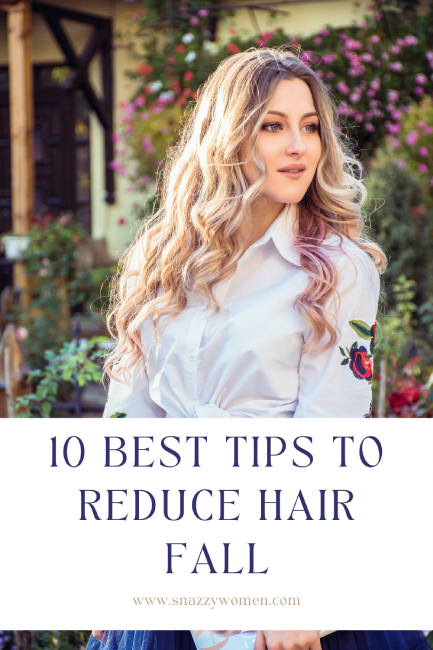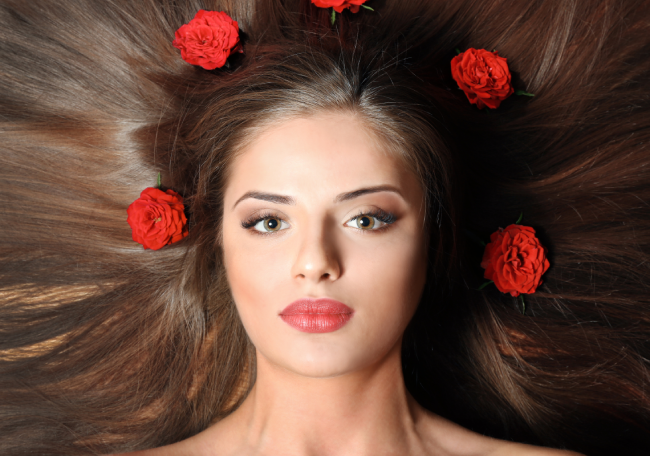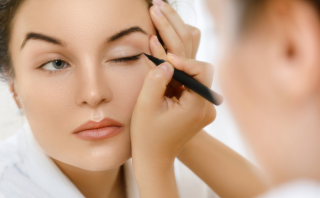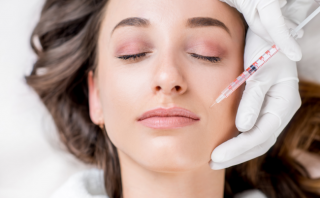Have you ever got stressed looking at those damaged and broken hair strands? Don’t fret! Here are the 10 best tips to reduce hair fall.
Hair fall is a serious concern for both men and women. Research shows around 40% of women suffer from hair fall and 25% of men experience baldness at the age of 25.
I know hair fall can become extremely annoying if not treated soon.
You will find tonnes of search results on the prevention of hair fall.
It’s extremely important to focus on the underlying cause of hair fall to say goodbye to lifeless hair strands.
This article will help you find the underlying cause and some of the best tips to reduce hair fall.
Make sure you follow these tips diligently to get voluminous hair. Get ready to get the hair of your dreams!
#1. Add Protein to Your Diet
A 2017 study found that people who suffered from extreme hair fall had low levels of amino acids and protein in their diet.
Amino acids act as a building block of protein. Hence, it is quite essential to have a diet rich in proteins.
Foods like nuts, beans, lentils, eggs, fish, turkey, and chicken are rich in proteins.
#2. Increase The Intake of Multivitamin Supplements
According to a review, vitamins and minerals play a vital role in reducing hair loss.
Vitamin deficiencies result in hair loss. Vitamins like A, B, C, D, zinc, selenium, and iron can help with hair growth, retention, and will naturally prevent hair fall.
#3. Wash Your Hair Regularly
Based on your hair texture and type, consider hair cleansing as part of your hair routine.
If you have oily hair, washing your hair frequently will unclog the pores and will also keep your hair clean and free from any infections.
If you have dry hair, wash it twice.
Washing it more than twice can strip off the natural oil from your hair, which will result in dry and damaged hair.
#4. Select a Gentle Hair Cleanser
Don’t get carried away by attractive branding, high-end shampoos, floral fragrances.
Read the ingredients before going with any cleanser. Understand your hair type and the underlying cause before picking a shampoo.
We recommend choosing a shampoo that is SLS (Sodium Lauryl Sulphate) and paraben-free.
Chemical shampoos might have good fragrances or be drugstore products.
But after a while, you’ll start to notice that your hair has become prone to damage and dryness.
It’s suggested to go with shampoos high in natural ingredients that are mild on the scalp to prevent hair fall.
This will ensure healthy and voluminous hair in the long run.
#5. Do Scalp Massages
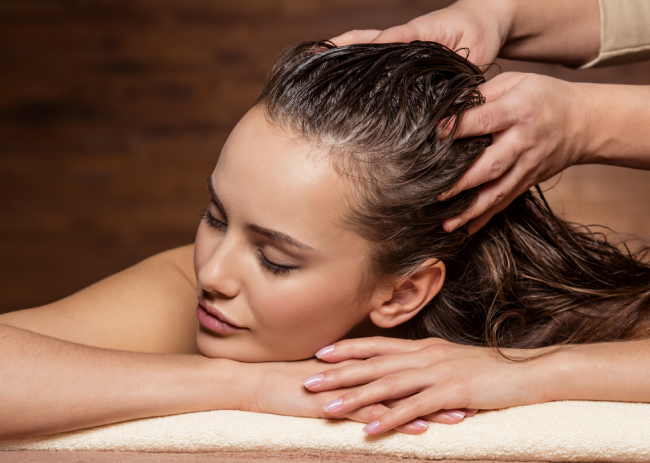
According to this study, a 4-minute good scalp massage stimulates hair growth and gives you lustrous hair.
Scalp massages are underrated. It’s the best way to pamper and relax your scalp.
Incorporate getting a good head massage twice a week into your habit by using any lukewarm oil.
Head massages stimulate hair growth by increasing blood circulation in your scalp.
It makes hair follicles stronger, which eventually helps in preventing hair fall.
Moreover, it also keeps your hair nourished and away from scalp infections.
To get the best results, it’s advised to cover your hair with a shower cap after a massage.
Here are the best oils for a scalp massage:
- Coconut oil: Coconut oil works best for damaged hair. According to this study says that it reduces hair fall and strengthens your hair.
- Almond oil: It adds lustre and shine to your hair as it’s highly rich in Vitamin E.
- Olive oil: It protects your hair from breakage and dryness. It works as a great oil to reduce hair loss and also conditions your hair.
You can apply the oil directly to your scalp and let it sit for at least 30 minutes before shampooing.
#6. Don’t Style Your Hair Frequently
Who doesn’t want to try the latest hair trends? Just to follow the trends, we tend to experiment with our hair with all those chemically treated products.
Don’t forget that hair is quite sensitive and these chemicals can be harmful in the long run.
Avoid using heat stylers on a regular basis. It can damage your hair shaft and increase hair fall.
In fact, use a heat protection spray before styling.
Skip tight ponytails, braids, and buns as they pull off your hair, which leads to excessive hair loss.
Let your hair breathe!
#7. Apply Homemade Hair Masks
Take a Sunday out from your tied-up schedule. Pamper your scalp with an enriched hair mask before stepping into the shower.
You can prepare your own DIY hair masks using some wonderful ingredients such as eggs, olive oil, henna leaves, avocado, yoghurt, bananas, etc.
Understand your hair type and prepare it accordingly. You can prepare endless DIY hair masks.
If you dislike preparing hair masks, you can easily find a good hair mask in the market based on your hair type and hair concern.
#8. Say No to Stress
Studies say that stress can not only deteriorate your hair but can also result in hair fall.
Practice calmness and declutter your mind to prevent hair fall.
When you get stressed, your body releases a few hormones like cortisol and epinephrine, which act as a barrier to hair stimulation.
Engage yourself in some mind-calming activities to destress your mind.
#9. Stay Hydrated
Hydration is the key answer to every concern that your body shows up.
Hydration ensures that your body is functioning well by transporting all the nutrients to every body part.
Drinking enough water to keep your body hydrated will also prevent hair fall.
It’s often advised to drink at least eight to twelve glasses of water for better hydration.
It keeps your hair and skin healthy.
#10. Avoid Styling or Combing Wet Hair
Never comb or style wet hair.
When your hair is wet, it becomes more susceptible to damage and breakage.
Once your hair gets dry, you can use a hairbrush to detangle your hair.
The Takeaway
Hair fall can be treated at home by incorporating a healthy diet and lifestyle.
If you’re experiencing excessive hair fall, consider visiting your doctor. Home remedies don’t work on the scalp when you’re suffering from other diseases.
It’s advisable to make an appointment with a doctor to detect the underlying cause of the hair fall.
Generally, hair treatment may take a year to show improvements in regions where hair loss has already begun.
